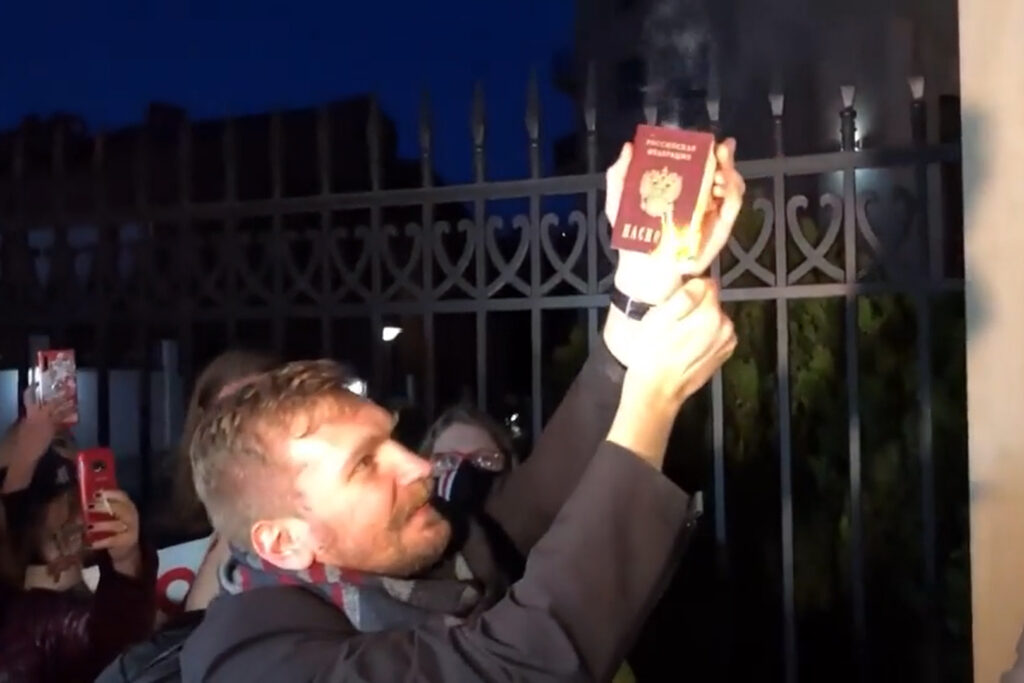At a demonstration in the Georgian capital, Tbilisi, on 25 February, Anton Mikhalchuk, a citizen of Russia, set alight his Russian internal passport, his identification documents, in support of Ukraine. Anton tells the story of fleeing to Georgia from repression in his homeland, and what Russia’s invasion of Ukraine means to him.
‘My name is Anton Mikhalchuk and I‘m 31 years old. I grew up in Tyumen, in Western Siberia, and lived there since I can remember — I graduated from school, university, worked, ran a small business, and was engaged in political election campaigns in Russia.’
‘I entered politics when I was 16. I worked on election campaigns, handed out newspapers, helped as much as I could. And over time, I began to lead the organisation and election campaigns myself.’
‘I went a long way before I came to live in Georgia. I worked in the organisation of Mikhail Khodorkovsky — Open Russia. I was engaged in the election campaign, I was the coordinator of the regional branch in Tyumen. In 2018, it was a very hot year politically.’
‘The next year, I left Russia due to the criminal charges brought against me.’
‘In Russia, a case was opened against me under the article on “cooperation with undesirable organisations” — this is a serious criminal offence and carries up to six years in prison.’
‘I feel safe in Tbilisi’
‘After thinking and weighing the situation — I thought of either leaving the country and maintaining my freedom or using the courts as a political platform — I decided that it would be better to keep my freedom. If I went to jail, the situation would still not change — most likely if I didn't leave, it would have ruined my own personal destiny and nothing else.’
‘I went to Paris for a few weeks to see what would happen in Russia, and the morning after I left, I found out that OMON, the riot police, had broken into my colleague’s house and arrested her.’
‘I am still on the federal wanted list, the case has not been closed.’
‘In spite of this, I have no fear that Georgia would hand me over if Russia demands my extradition. I do not feel threatened in Georgia; I feel comfortable. Moreover, a case was initiated against me under a political article. I didn’t do anything wrong.’

‘Now I’m in Tbilisi, I’ve been living here for two and a half years. People treat me better here than in Russia. In terms of society, people and public perception, Georgians are by nature much kinder and warmer towards each other, people are more emotional and have a desire to help each other. ‘
‘Russians and Siberians are often very closed and difficult people. Moreover, here I have no problems with the authorities, but in Russia I do.’
‘A protest against the Russian state’
‘This action, when I burned my internal Russian passport at a demonstration in Tbilisi supporting Ukraine, it was a form of protest against the activities of the Russian state.’
‘I absolutely do not want to have anything to do with a state and government that commits such offensive actions.’
‘In Ukraine, there is now a war going on completely produced by Putin and his entourage. These are his ambitions, muscle-flexing. The current situation was preceded by a long geopolitical history, but what is happening now is a huge disaster.’
‘The fact is that Ukraine will recover from this situation very quickly, and for Russia, there will be massive and terrible consequences, which we will see in the future.’
‘What is happening is complete nonsense. All this was arranged by a small group of people who are puzzled by their own interests and have nothing to do with the interests of Russia.’
‘I do not plan to apply for citizenship of another country because I want to remain in Russian politics, and if I take political asylum or change citizenship, I will no longer have the moral right to deal with the Russian agenda — this is my choice.’
‘I considered that a Russian internal passport is a symbol of the state, and I set it on fire yesterday. It did not light up at first, but then it flared up and burned to the ground.’




 25 February 2022
25 February 2022




